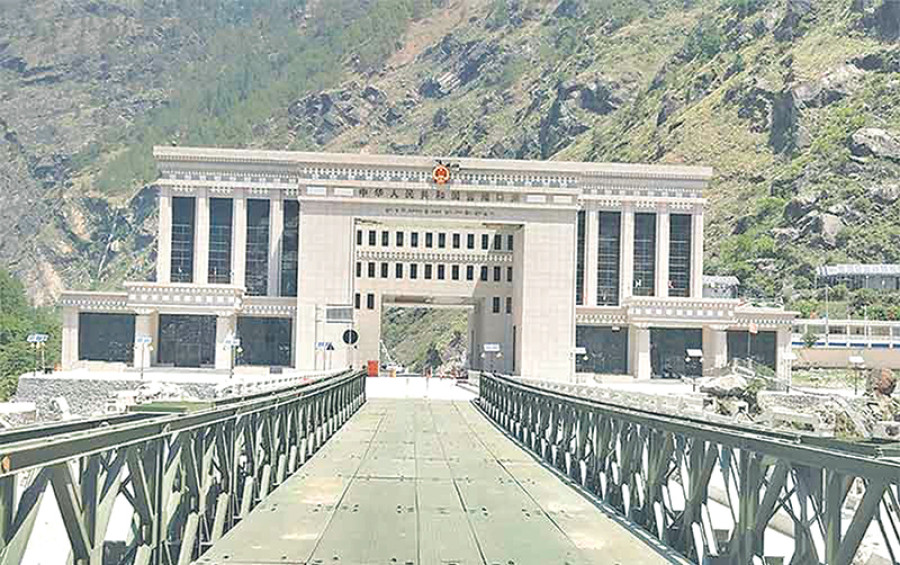Opinion
Frontier governance
Successful governance of Tibet has provided a good external environment for Nepal
Gao Liang
Frontier governance is an issue that has been actively researched and promoted by the Chinese government and academia in recent years. As a country with a vast territory, China’s dynasties have regarded the governance of the border areas as a vital part of the country’s political life. The reason is that security and stability of the frontiers are directly related to the prosperity and rise and fall of the entire country. Throughout China’s long history, we can find that a strong dynasty could always effectively control the frontier and ensure stability there, while its decline often began with the failure of its frontier governance.
Country’s territory
In Chinese academic terms, the frontier, or bian jiang in Chinese, literally refers to the edge of a country’s territory. It has great differences with the main body of the country in terms of geographical environment, ethnicity, language, religion and so forth. The existence of such dissimilarities makes the full implementation of state power in these areas difficult. From this perspective, the frontier also refers to the edge of national capabilities. Therefore, all past Chinese dynasties adopted policies for the frontier that were different from the main part of the country in accordance with local conditions and the state power structure of the time with a common goal to maintain the country’s unity.
The frontier is extremely important to a country. This part of the territory is the front line of national defence. It plays a role in defending the heartland and reflects the country’s strategic depth. The far-flung frontiers are also an important resource reserve in the development of the country, providing geographical space and natural and human resources for the country. The westward movement of the US was a process of continuous development of its frontier resources which helped the entire country to progress immensely. As far as China is concerned, the frontiers, especially land frontiers, are precious gateways to its opening up. Considering the Belt and Road Initiative which leads the country westward, the development and opening up of the frontier regions is becoming increasingly important.
However, the frontier is also extremely fragile and sensitive. The diverse ethnic and religious composition of the frontier regions has always been a major cause of conflict. Ethnic disputes and religious contradictions often lead to turbulence and unrest. The frontier is also the part of the country that borders neighbouring countries. The borderland bears the brunt of cross-border crime that comes with cross-border exchanges.
What’s worse is that frontiers often come with territorial disputes. The spill-over effect of frontier governance will directly affect neighbouring countries and vice versa. The fate of neighbours is closely linked, like the old Chinese proverb that says, “Chun wang chi han,” (if the lips are gone, the teeth will be cold). In this sense, frontier governance is both a domestic issue and, to some extent, an international one. In the context of globalisation and regional integration, frontier governance also needs to break through the traditional governance model, pay more attention to regional and even global perspectives and include neighbouring countries and regional factors in policy formulation.
Nepal shares a 1,415-km border with the Tibet Autonomous Region (TAR) in the south-western frontier of China. The close historical, religious and economic ties are deeply rooted, for which reason Nepal has an irreplaceable impact on the security, stability and prosperity of the TAR. Likewise, the successful governance of the TAR has also provided a favourable external environment and opportunity for Nepal’s national construction. This shows that the spill-over effect of governance, be it good or bad, is mutual.
At the national level, the goal of governing the frontier is to achieve unity, stability and prosperity in the borderlands. To this end, the state implements special political, economic, social and cultural measures and policies in these regions; and the current strengthening of Sino-Nepali relations has benefited from that purpose to a large extent. The core logic is to strengthen the inter-connection of resources, facilities and other aspects within the region and achieve common development inside and outside one’s frontier, thus establishing a community of shared destiny with the frontier as the carrier.
In fact, if we look at the Tarai from the perspective of frontier governance, we will find that the emergence and development of related issues are highly consistent with frontier issues. Looking back in history, we can see that all the major turning points in the Madhesi movement are not only closely related to Nepal but also to the neighbouring stakeholder. The open border, Nepali-Indian links and multi-dimensional cooperation between the two countries in related fields make the governance of the Tarai region and the neighbouring north Indian frontier regions typical of regional governance.
This set of governing patterns explored by Nepal is different from the Chinese way; it combines governance of the Tarai region with bilateral cooperation with India. The trend of taking factors from beyond the border into account is becoming more obvious since the recent high-ranking diplomatic exchanges between the two countries. Border management, trade and other cross-border activities require close and sincere coordination between two sides to achieve meaningful results. The two countries are still working hard to strengthen such cooperation. The successful experience between Nepal and India in these areas is a great example for China and Nepal in their frontier-governing cooperation.
Sovereign equality
It should be pointed out that regionalism in frontier governance should not lead to a blurring of sovereignty. Its core spirit is policy coordination and cooperation on the basis of sovereign equality and non-interference in internal affairs. The various issues related to the frontier can be easily affected by other parties, sometimes even issues directly related to the territorial integrity of the country. A unified, stable and prosperous frontier, which can be achieved by strategic and policy collaboration based on mutual respect, will enhance the identity of the frontier people towards the nation-state, and thus consolidate their respective sovereignty.
Liang is a doctoral student at Sichuan University, China




 21.12°C Kathmandu
21.12°C Kathmandu










